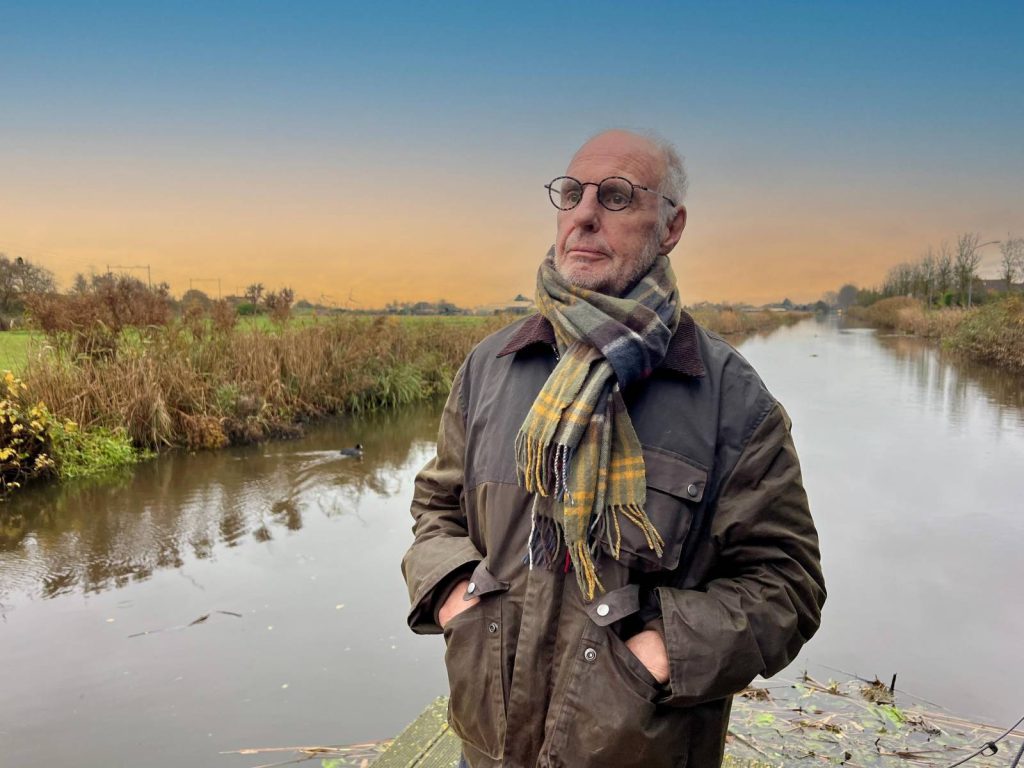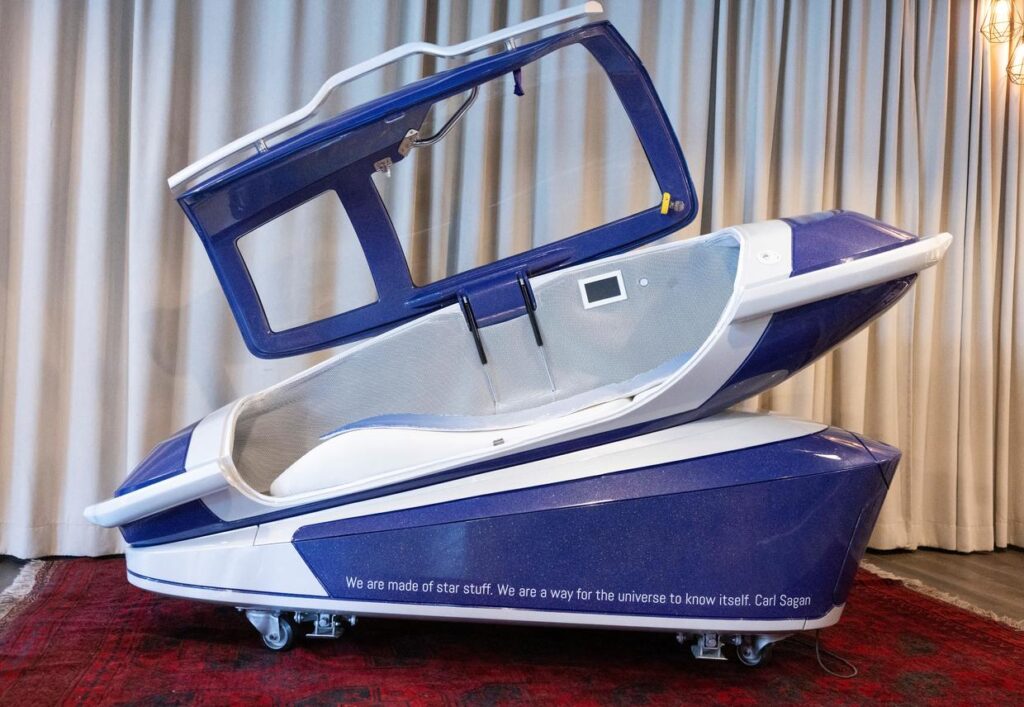Suicide capsule inventor Philip Nitschke talks about the Sarco premiere for the first time. He considers the criminal proceedings for intentional homicide to be absurd. In this interview, Nitschke tells us what he is planning next.
By Simon Hehli NZZ

Mr Nitschke, on 23 September, a woman died for the first time in your suicide capsule Sarco. Did you feel a sense of triumph?
No, rather a feeling of relief that the Sarco, in which we had invested so much work, worked as planned. Just as we had predicted on a scientific basis. Above all, I was happy that the woman was able to have the peaceful death she had wished for. There were discussions as to whether death by asphyxiation with nitrogen is really so peaceful and quick. Also because of the experience with the execution in Alabama.
In January, a murderer was executed there with nitrogen for the first time. Before he died, he jerked violently and gasped for air.
I travelled to the USA before the execution and tried to convince the authorities to stop the whole thing. Unfortunately without success. It is a completely different matter whether someone voluntarily lies down in the Sarco or whether a condemned person resists the execution. Because the nitrogen mask has slipped, with all the terrible consequences that entails.
Who was the American woman who died in the Sarco? What were her motives?
She was one of the people who contacted us after we publicised our plans for Sarco in Switzerland. I was not involved in choosing this woman as the first Sarco user, but I looked at her health records. She had so many medical problems. I fully understood her rational decision to end her suffering. That’s all I want to say about her.
Are you now so reluctant to provide information because you have been accused of putting on a media circus and parading the Sarco users, instrumentalising them?
No, but her person and her motives have been somewhat overshadowed by all the unbelievable things that happened after her death.
You mention the proceedings against your fellow campaigner Florian Willet. Why weren’t you in the forest in Schaffhausen yourself during the Sarco premiere?
I installed the Sarco on site and tested it for several days. But I couldn’t be there on 23 September. I had to give a lecture in Budapest and therefore had to be back in Amsterdam in time. But of course I followed everything from afar. Florian knew what to do. He didn’t need me there.
Wasn’t it mainly about evading the Swiss authorities?
We had intensive discussions with our lawyers before 23 September. Their advice was that several people from our organisation should not be present on site at the same time. From a legal point of view, it made sense for Florian to take on the role, partly because he lives in Switzerland, is a lawyer and managing director of our Swiss branch, The Last Resort.
Willet has been in custody for more than seven weeks. Were you surprised at how rigorously the Schaffhausen judiciary is taking action against your organisation?
To say I was surprised would be a complete understatement. I am perplexed and deeply disturbed by what is happening here. We knew there would be an investigation, that’s standard practice. But we were and are convinced that everything we do is in full compliance with Swiss law, so we were relaxed about it. But when rumours emerged that the Schaffhausen public prosecutor’s office was investigating on suspicion of intentional homicide, I was horrified.
Strangulation marks were said to have been found on the American woman’s neck.
Absurd! This is allegedly the result of a telephone note at the time of the autopsy. However, an autopsy report is still not available today. I cannot understand why such a report should not be available after more than fifty days. And this while Florian is in custody. In addition, the public prosecutor’s office apparently has documents according to which no DNA from Florian was found in the neck area of the deceased.
What happened in those minutes that you watched from afar?
I was able to see everything live through the cameras we had installed inside and outside the Sarco. I heard the conversations between Florian and the woman. I also monitored the oxygen levels in the capsule. Everything happened exactly as we had predicted. The woman got into the Sarco alone, closed the lid without help and pressed the button that released the nitrogen on her own. She lost consciousness and died after about six minutes.
There are rumours that the Sarco did not work as planned. It is therefore only a small step to speculating that Willet may have assisted in the woman’s death.
I don’t know who starts such rumours. There is not the slightest indication of such a scenario. From the time the woman got into the Sarco until the police arrived, nobody opened the lid. We documented everything, including the oxygen content in the capsule, which was always at a lethal level.
The public prosecutor’s office is apparently accusing you of not co-operating.
That’s not true. Me and my wife wanted to come to Switzerland from the beginning to make a statement. The public prosecutor’s office refused.
But your office in Harlem was searched.
Yes, the Dutch police came by, probably on behalf of the Swiss authorities. I didn’t even get a list of the things they took – including a model of the Sarco.

A second accusation is that you are offering suicide by Sarco for selfish reasons – for example, to enrich yourself.
I am an activist and I want the world to be a better place. That’s what I’ve been doing for thirty years. It’s not about making a profit with Sarco and there is no business model behind it. Fortunately, we have enough money – also to continue developing the Sarco.
How much has the development and production of the Sarco cost so far?
Almost a million dollars. There is a lot of technical innovation in the capsule, we have been working on it for almost ten years. And there have been a few setbacks along the way.
Where does all this money come from?
From donations. There are many people who can see what a step forward the Sarco is. It makes euthanasia so much easier.
Will the use of the Sarco always be free, apart from the few francs for the nitrogen?
Yes, this is also an ethical question. We are convinced that you shouldn’t charge money for an assisted death. Especially when you realise that it is already very expensive for foreigners who wish to die to travel to Switzerland.
You are thus challenging the Swiss euthanasia organisations, whose business model is to charge foreigners around CHF 10,000 for their services. Is that why you accused these organisations of plotting against you?
I am very disappointed at how little openness euthanasia organisations have towards new technologies – and not just in Switzerland. I’ve only heard silly arguments against Sarco. For example, that nobody wants to die isolated from the world. That’s simply not true, otherwise hundreds of interested parties wouldn’t have contacted us. It’s a gain if there is freedom of choice in assisted suicide.
Anyone who talks to local euthanasia activists will hear another accusation levelled at you: that you want to make means of suicide easily accessible to everyone – including young, depressed people who act on impulse. Is that your aim?
Anyone who makes such a claim has clearly misunderstood our motives and ambitions. We abide by Swiss law – and it rightly stipulates that someone who wants to make use of euthanasia must be capable of judgement. An 18-year-old who is lovesick is obviously not a Sarco candidate. As stated on The Last Resort’s website, only people aged 50 and over are eligible for Sarco.
The accusation also stems from the fact that you published the book ‘The Peaceful Pill’ – in which you describe various suicide methods in detail.
I wrote the book for the members of our organisation Exit International. They are on average 75 years old. There is a great need among older people for information on assisted suicide, and they have every right to receive this information. Many of our members have a lethal dose of pentobarbital in their cupboard and know how to use it thanks to the book. This gives them great peace of mind. It was never my intention that young people would misuse the information to kill themselves. Anyone who wants to buy my book must therefore prove by video and ID that he or she is at least 50 years old.
One of your main arguments in favour of the Sarco is that it eliminates doctors as the authority who have to prescribe the pentobarbital. Why is that so important to you?
The Swiss model is so much better than the regulations in most countries around the world. I have been repeating this for years when I travel the world and speak to parliamentary committees. I tell them: Take a leaf out of Switzerland’s book.
But?
The problem is that in Switzerland, too, someone judges whether another person is suffering enough to be allowed to die. Doctors take on this judgement role. That is an imposition. Doctors are often overly critical of euthanasia. No, the decision must lie with the person concerned, not with some gatekeeper. Sarco makes this possible.
The Swiss euthanasia organisations say that it is not a major problem to obtain the lethal pentobarbital.
According to the current rules of the Swiss Medical Association, only those who are so ill that they are ‘suffering unbearably’ should receive euthanasia. A few years ago, the well-known Australian botanist David Goodall wanted to die in Switzerland. The man was 104 years old and simply tired of living. He should have pretended to be ill. But he understandably refused. It was not so easy for him to find a doctor who would help him anyway.
Do you not understand the fears that Sarco would further boost ‘death tourism’ in Switzerland?
I don’t think the situation would change much. Many people already come to Switzerland today and are grateful for the progressive rules. You Swiss should be proud of that! Look at the UK, for example, I’m following the debate there very closely. There is to be a new euthanasia law. It will be so restrictive that many Britons will still feel compelled to travel to Switzerland to die.
But it is precisely these liberal rules that could now be jeopardised because of all the fuss surrounding Sarco – because some politicians feel compelled to regulate euthanasia more strictly.
I’m not particularly impressed by that argument. It could be used to oppose any innovation: Why should we change anything? We’ve made ourselves comfortable. But the current solution is not ideal for people who are looking for help with dying. That’s why Sarco is needed. It seems as if Switzerland has suddenly become afraid of its liberal legislation and its pioneering role worldwide.
Have you underestimated how critically Swiss politicians view your capsule? Interior Minister Elisabeth Baume-Schneider said that its use was not legally compliant – pretty much at the very moment you used the Sarco for the first time.
I have no idea how Mrs Baume-Schneider arrives at such an assessment. It contradicts all the opinions of Swiss lawyers that we have obtained. And also from professors who spoke out after the Sarco premiere. Of course, we hadn’t planned for the first deployment to take place at the exact moment when the minister responsible was making a statement about Sarco. That was an unfortunate coincidence.
The serious allegations made against you by Jennifer McLaughlin also caused a stir. The woman who should have been the first to die at Sarco called you and your fellow campaigners ‘heartless people’ and said that you were only interested in generating public attention. How did this break come about?
It was a mistake that we chose her first, I wish we had realised that earlier. She had serious mental health problems, and I have experienced episodes of this myself. I firmly reject your accusations, they are demonstrably untrue. That is why your newspaper corrected these accusations, at least in part.
Before McLaughlin died at a Swiss euthanasia organisation, a psychiatrist stated in an expert opinion that she was of sound mind. Are you accusing him of negligence?
No. But unlike me, he didn’t have the opportunity to accompany Jennifer over a longer period of time. I’ve been a doctor long enough to know that an assessment of a patient’s mental state also depends on how they are feeling on the day.
You implicitly say that the Swiss organisation broke the rules by helping a mentally ill woman to commit suicide. That’s a strong accusation.
They can do what they like, it’s none of my business. I’m just glad that the woman didn’t die in the Sarco.
The question now is whether and when the Sarco will be used again. Will you wait until the proceedings against Florian Willet are over?
Yes, definitely. We want a clear decision from the judiciary before we bring Sarco number two, which is currently in production, to Switzerland. Sarco number one, with all its innovative software, is still confiscated. The investigations can only have one outcome: that the Sarco does not violate any Swiss law.
The legal proceedings could take months or even years. Are you looking around for alternatives to Switzerland?
I hope it will be quick. But there are other places where we could take Sarco. For example, to Finland, where, according to our lawyers, there is no specific law prohibiting assisted suicide. Another possibility is for people who want to die to produce the Sarco themselves in a 3D printer, get in and press the button. No country in the world can prohibit people from committing suicide.
